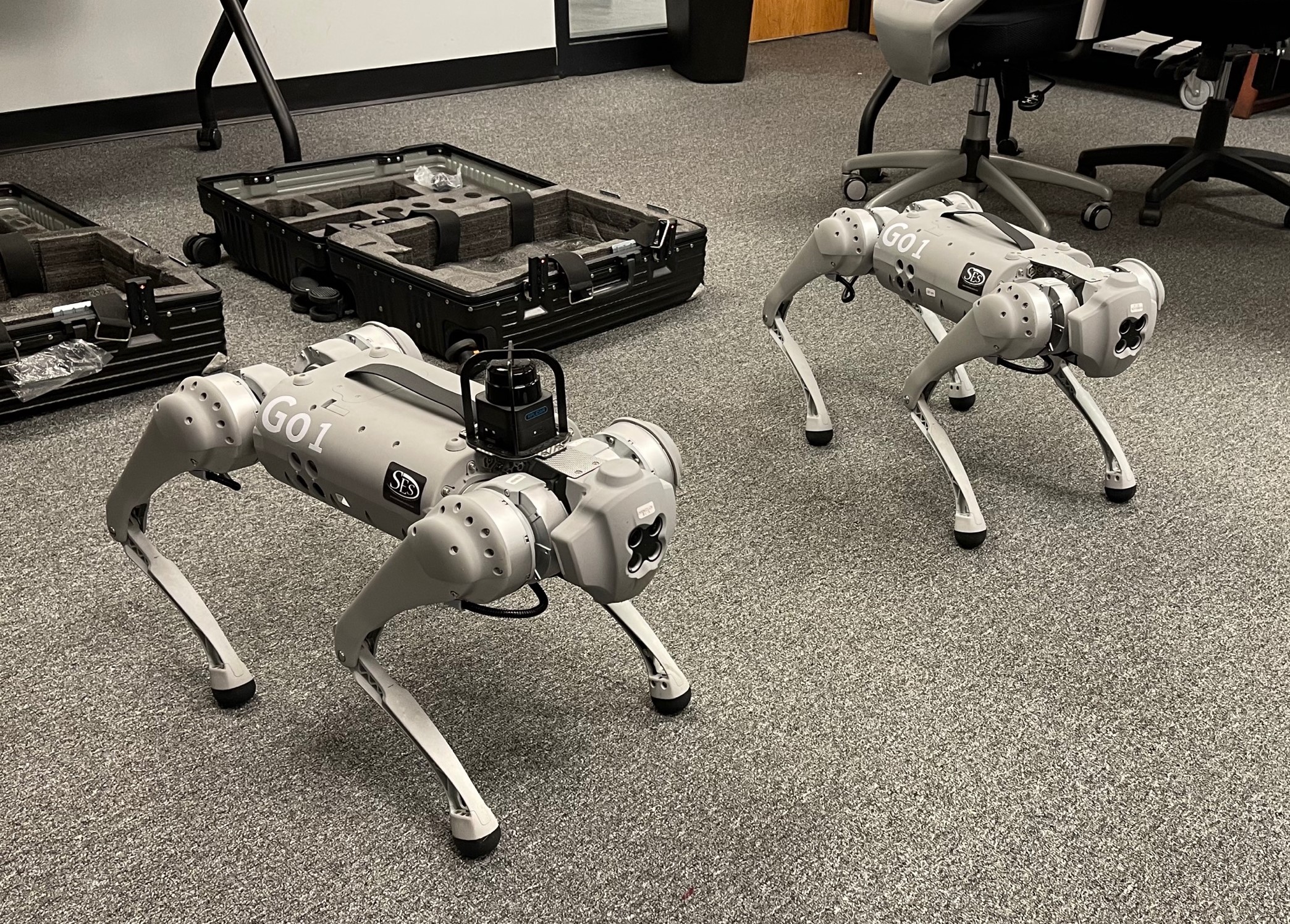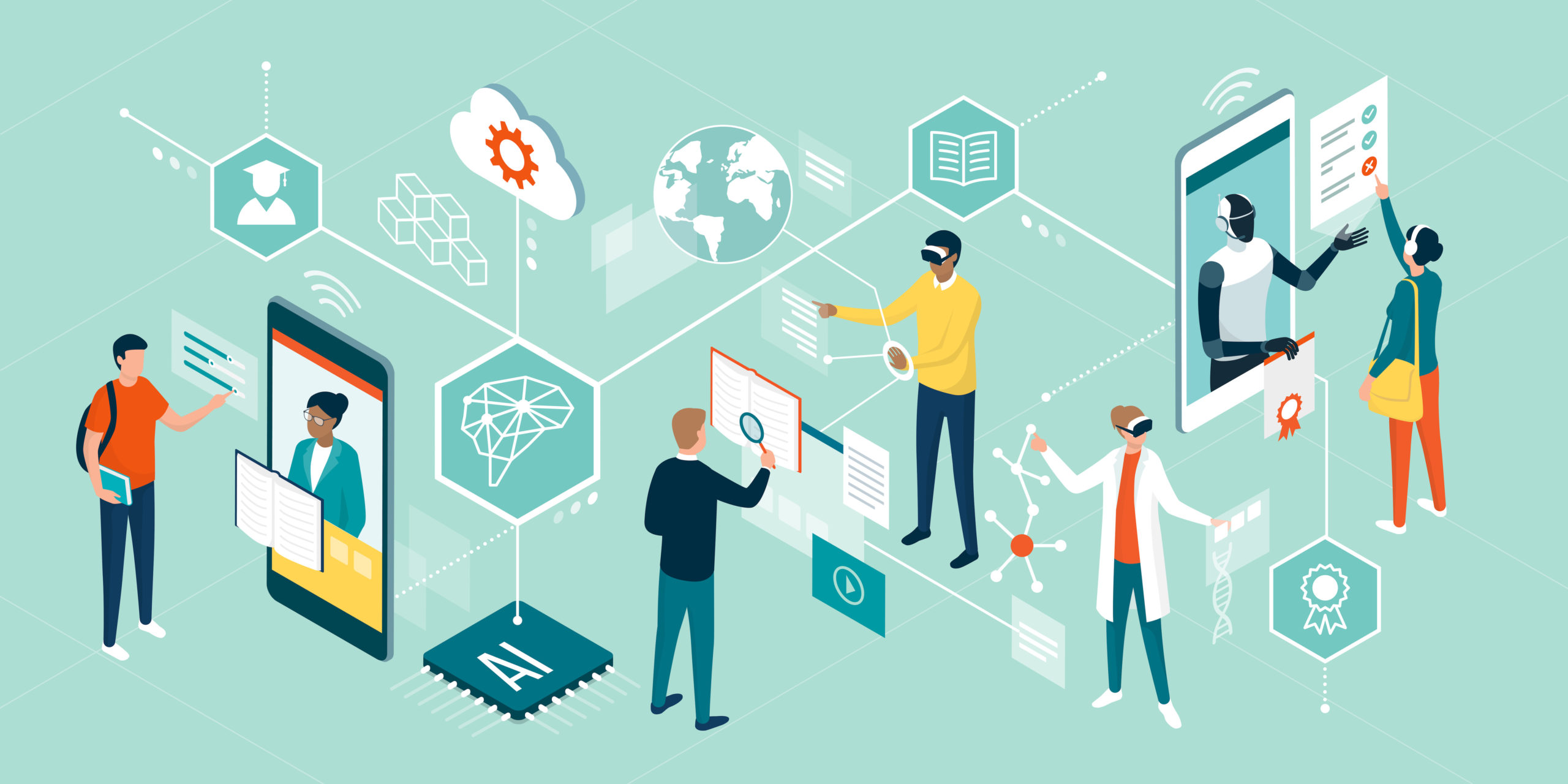Two weeks ago, I received an invitation that would make most techies bark with excitement. I was invited by our friends at Baltimore County Public Schools (BCPS) Career & Technical Education (CTE) to come and play with robot dogs. These dogs are going to be part of the Robotics and Artificial Intelligence program BCPS CTE is creating. I was there to provide some industry perspective on how to grow the right skills for students’ future success.
It was a brilliant afternoon, and it got me thinking…
In today’s economy, it’s more important than ever for companies to have a skilled and qualified workforce. We hear this from our clients all the time. However, with the ever-changing landscape of technology, it’s difficult to keep up with the demand for new skills.
Fortunately, that’s where partnering with local schools and community colleges can make a big difference. By collaborating with these institutions, companies can help ensure that the workforce of tomorrow is well-prepared to meet the demands of the future.
Why Partner with Local Schools and Community Colleges?
For starters, it helps to ensure that there is a pipeline of qualified candidates for open positions. Right now, hiring is hard. Having a strong talent brand can make it easier. People want to work with companies they know and respect. By collaborating with educational institutions, companies can make sure students know who you are. You can build relationships with students, and best of all, your company can help shape curricula to better match the needs of the workforce.

Through partnerships with various community colleges and local school systems, Mind Over Machines is defining the skills we, and our clients, need for the future so that these institutions can create capable team members. This is a true ecosystem. We provide insight into what the job market is looking for, and our community partners help grow that talent.
This ecosystem of opportunity enables everyone to win, especially our internal team members and potential team members (i.e., current students).
What Are the Benefits of Upskilling and Reskilling Employees?
Okay, schools provide a great pipeline, but what about your existing team members?
Existing team members benefit from working with schools because they get opportunities to upskill their mentoring capabilities. Team members can collaborate with students and educators to shape the future and, in doing so, grow their own leadership, innovation and communication skills.
These programs not only build skills, they also help employees feel valued and motivated, which can lead to increased productivity and retention. Valued employees are more likely to feel engaged with the mission of the organization. Be clear on how your school outreach programs are aligned with your company’s mission.
At Mind Over Machines, our mission is to Enrich Lives by Helping the World Work Smarter. As our team members help with local colleges and schools, we remind each other how our work is directly achieving our mission. We communicate to students how our projects drive our mission. This not only engages the students, but also reminds team members of the very real impact they are having on the world.
How Do Enterprise-Education Partnerships Improve the World?
Think bigger than your company and local school/community colleges. Collaborations between business and students can lead to a better world. As tech companies like Mind Over Machines are changing the world, our stories inspire learners, not just with the cool stuff we build, but also with how we’re solving real-world problems.
Everyone wants to work on the hottest new tech or the buzzy new idea, but when you focus on telling stories of impact and showing metrics of change, students can see there’s more to the world than the latest buzz. When local tech professionals work with students, they provide a great reminder that not everyone will build general AI systems or the next big crypto finance craze. We need people to build business intelligence dashboards that enable nonprofits to better serve their constituents; we need processes automated to help hospitals triage their critical care cases with predictive analytics; we need 3D models of HVAC systems to create energy efficiency in building designs, and we even need people who can build pivot tables in Excel to improve marketing communications. All these roles provide value and improve their corner of the world.
There are so many cool things students can be enamored with in tech. As companies partnering with these organizations, we need to show students that you don’t have to work with the latest buzzwords or be the next Elon Musk to make a real impact. There are countless career trajectories, ample opportunities to grow your skills while serving and inspiring your neighbors.
Let’s Build Our Future, Together
Our educators are working hard to prepare the workforce of tomorrow, but they can’t do it alone. It’s essential for companies to collaborate with local schools and community colleges. By shaping curricula and partnering with teachers and students, businesses can create a sustainable talent pipeline for the future. Through these partnerships, our team members can learn new skills and feel valued, engaged, and motivated. As students see the value and diversity of our work, they will be inspired to make a real impact on the world.
We are the shepherds of our future. Get out there and show your flock a future we all can build together.
 About Tim
About Tim
Tim Kulp is the Chief Innovation Officer at Mind Over Machines. He’s trying to change the world. His mission: Stop the automation apocalypse by empowering humans. With years on the front lines of automation, Tim leads workers and business leaders to realize the potential of a human + machine future and disavow Sci-Fi’s human vs. machine dystopian nightmare.
Kulp’s publication credits range from technical (MSDN Magazine, 2600 Magazine) to business strategy (CMSWire, Forbes, SHRM.org). In addition to his writing, Tim frequently presents across the Mid-Atlantic region. He speaks about how AI is changing the workforce and the world at internationally recognized institutions (Johns Hopkins University), national conferences (ASAE, MTForecast), and government economic policy agencies (Federal Reserve).
Kulp holds a B.A. in Religious Studies from McDaniel College, an M.S. in Applied Information Technology from Towson University, and a post-baccalaureate certificate in Information Security, also from Towson. He is a member of the Forbes Tech Council.









